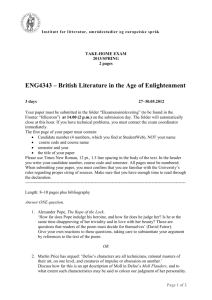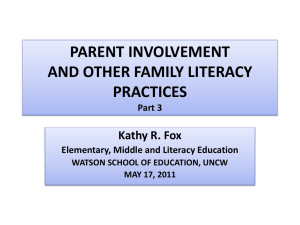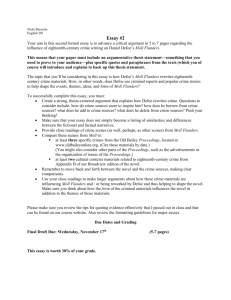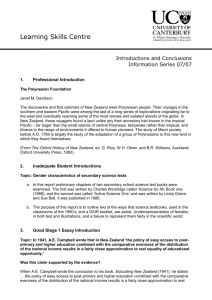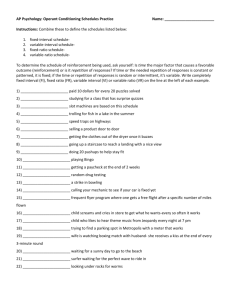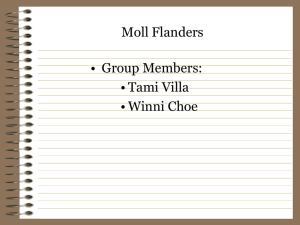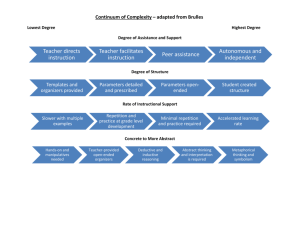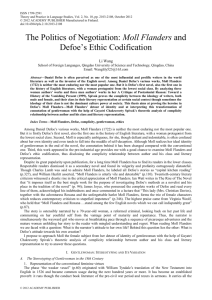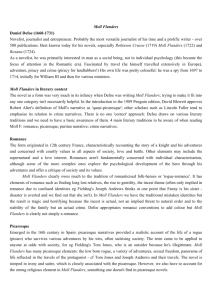Repetition in Moll Flanders
advertisement
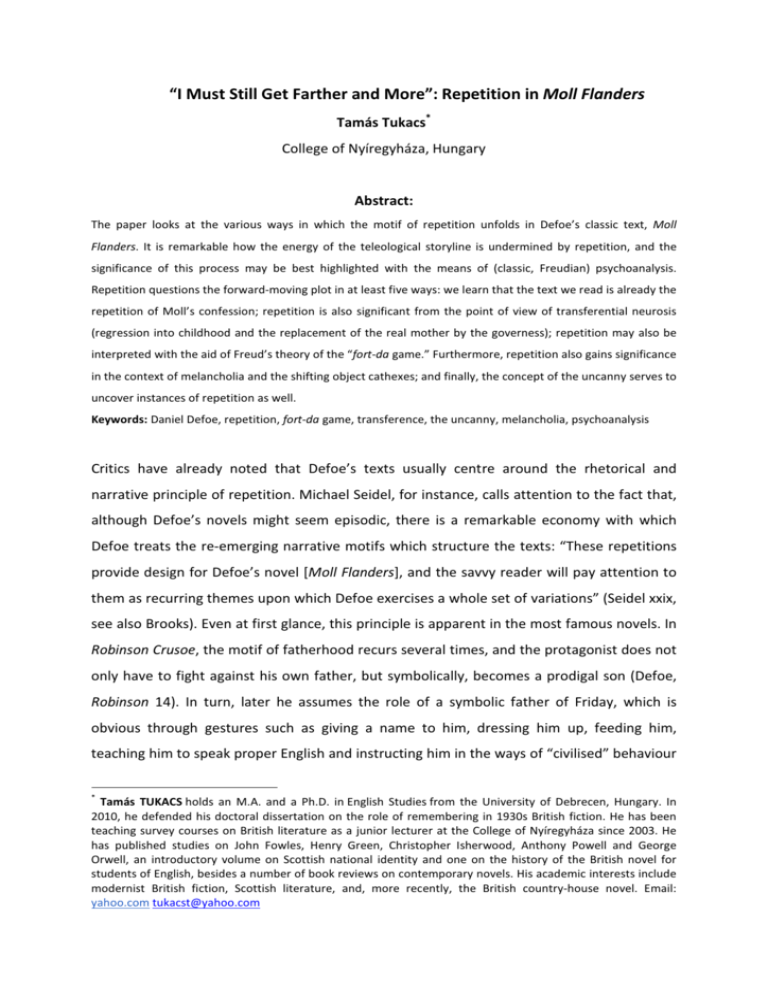
“I Must Still Get Farther and More”: Repetition in Moll Flanders Tamás Tukacs* College of Nyíregyháza, Hungary Abstract: The paper looks at the various ways in which the motif of repetition unfolds in Defoe’s classic text, Moll Flanders. It is remarkable how the energy of the teleological storyline is undermined by repetition, and the significance of this process may be best highlighted with the means of (classic, Freudian) psychoanalysis. Repetition questions the forward-moving plot in at least five ways: we learn that the text we read is already the repetition of Moll’s confession; repetition is also significant from the point of view of transferential neurosis (regression into childhood and the replacement of the real mother by the governess); repetition may also be interpreted with the aid of Freud’s theory of the “fort-da game.” Furthermore, repetition also gains significance in the context of melancholia and the shifting object cathexes; and finally, the concept of the uncanny serves to uncover instances of repetition as well. Keywords: Daniel Defoe, repetition, fort-da game, transference, the uncanny, melancholia, psychoanalysis Critics have already noted that Defoe’s texts usually centre around the rhetorical and narrative principle of repetition. Michael Seidel, for instance, calls attention to the fact that, although Defoe’s novels might seem episodic, there is a remarkable economy with which Defoe treats the re-emerging narrative motifs which structure the texts: “These repetitions provide design for Defoe’s novel [Moll Flanders], and the savvy reader will pay attention to them as recurring themes upon which Defoe exercises a whole set of variations” (Seidel xxix, see also Brooks). Even at first glance, this principle is apparent in the most famous novels. In Robinson Crusoe, the motif of fatherhood recurs several times, and the protagonist does not only have to fight against his own father, but symbolically, becomes a prodigal son (Defoe, Robinson 14). In turn, later he assumes the role of a symbolic father of Friday, which is obvious through gestures such as giving a name to him, dressing him up, feeding him, teaching him to speak proper English and instructing him in the ways of “civilised” behaviour * Tamás TUKACS holds an M.A. and a Ph.D. in English Studies from the University of Debrecen, Hungary. In 2010, he defended his doctoral dissertation on the role of remembering in 1930s British fiction. He has been teaching survey courses on British literature as a junior lecturer at the College of Nyíregyháza since 2003. He has published studies on John Fowles, Henry Green, Christopher Isherwood, Anthony Powell and George Orwell, an introductory volume on Scottish national identity and one on the history of the British novel for students of English, besides a number of book reviews on contemporary novels. His academic interests include modernist British fiction, Scottish literature, and, more recently, the British country-house novel. Email: yahoo.com tukacst@yahoo.com 2 (see, for instance, 176, 179). Another motif which is repeated in Robinson – shedding light on the obsessive features of repetition to be discussed later – is the “middle station of life” (9), against which Robinson first rebels, but which, in the later course of his life, he does reach, as if against his will, in the Brazilian plantations (34). Here, he points out the basic irony of his life, which is also going to be characteristic of Moll Flanders’s fate: “I had no remedy but to go on” (31). The organising principle of repetition may have its origins in the requirements of the early English novel in creating as much suspense as possible, but more importantly, it raises questions as to the author’s intentions as well. Were these episodes inserted in the novels self-consciously? Did Defoe have a purpose with them? Do they reveal any ironic intention? The questions of aesthetic considerations aside, I think the repetitive (almost obsessively repetitive) structures of Moll Flanders and Robinson Crusoe shed light on the logic of early capitalism and Defoe’s (and his characters’) famous obsession with money (see, for instance, Hammond 100; Connor 106). It is as though the protagonists were not able to reconcile themselves with the vicious circle of the Protestant work ethic. Even though they prove to be successful, as far as their accumulation of material wealth is concerned, they have “to go on,” which, in the case of Robinson (in Brazil) leads to greater alienation, in Moll’s case, to an even deeper immersion in sin. Besides, both characters wish to work through the original trauma of separation from parents, which they assume to be tainted with sin, and in their attempts they come to terms with these losses, they show signs of a growing dependence on money and repetitive actions. In what follows I am going to introduce repetition into Moll Flanders through a “classic” Freudian reading that might illuminate Moll’s character better and serve as a counterpart to Robinson’s conflict with his father. In Moll’s case, we have a sort of Oedipal structure in which motherhood plays a central role. While Robinson willingly embraces the father’s role, it is Moll’s reluctance to become a mother and remain a child that is highlighted through repetitions. One of the ways of looking into the problem of obsessive repetition is beginning to read the text backwards, that is, from Moll’s confession scene: 3 The minister pressed me to tell him, as far as I thought convenient, in what state I found myself as to the sight I had of other things beyond life. He told me […] that his business was to move me such freedom of discourse as might serve to disburthen my own mind, and furnish him to administer comfort to me as far as was in his power […]. This honest, friendly way of treating me unlocked all the sluices of my passions. He broke into my very soul by it; and I unravelled all the wickedness of my life to him. (Defoe, Moll 316-317) As can be seen from the quotation above, the text of the novel is already a repetition of the confession. The extract informs us of two things. The minister in the prison acts as a sort of psychoanalyst whose method could best be described as a talking cure: he gives Moll the “freedom of discourse” that might serve to “disburthen” Moll’s mind of painful memories. The second thing we learn from the passage is that the memories she relates to the chaplain are heavily energy-charged: they unlock “all the sluices of [her] passions” and the minister breaks into Moll’s very soul. The fact, however, that the confession has to be repeated as the text of the novel might suggest that this talking cure was not totally successful. In this case, the repetition of the confession as written text must have had a therapeutic function and its purpose should be to render Moll’s painful memories into a rational structure. As we learn from the preface of the novel, “the original of this story is put into new words […] particularly she is made to tell her own tale in modester words than she told it at first, the copy of which came first to hand having been written in language more like one still in Newgate than one grown penitent and humble as she afterwards pretends to be” (1, emphases added). That is, the version that we read is a tamed, a “polished” one that has been reworked, suggesting that the original narrative (the text of the talking cure) had to be modified, as it was not fit to be presented as a teleological storyline. It sounded as a narrative of someone who was not able to rework the trauma that can be linked to the scene of the prison. She only pretended to become penitent and humble (which would correspond to a successful coming to terms with the original trauma), as she seems to be unable to break out of the repetitive structure of the process. Although she is released from the prison, her text symbolically remains there. Moll Flanders was born in Newgate, as she was told later, her mother “pleaded her belly”, then “obtained the favour of being transported to the plantations” (8), and left Moll when she was about half a year old. The result of this original trauma – or more precisely of 4 the reconstructed narratives she afterwards hears – was, on the one hand, that the two places, the prison and the plantations, were fixed in her mind, and will serve as symbolic places of cure for the traumatic loss. The return to these energy-charged symbolic places will present repetition as neurotic reiterations of the painful experience of the loss in order to overcome and master it. On the other hand, the most favourable path that Moll “chose” to heal the painful scar is regression. Her ego-development seems to have been arrested at an infantile level, the experience of loss being so grave that often she can do nothing but act out her childhood and the loss of her mother again and again. Describing the situation she was in after the loss, she says: “Had this been the custom in our country [i.e., that the children of criminals are immediately taken into the care of the government], I had not been left a poor desolate girl without friends, without help or without helper in the world as was my fate” (8). Later in her life, having become a successful thief, she still ponders upon what seem to be problems of lonely existence: without help we must perish; and this help requires not only an assisting hand, whether of the mother or somebody else, but there are two things necessary in an assisting hand, care and skill […]. All those things represented themselves to my view, and that in the blackest and most frightful form; and as I was very free with my governess whom I had now learned to call mother […] She asked me if she had not been careful and tender of me in my lying in, as if I had been her own child.” (189-90, emphases added) Moll is unable to get rid of the feeling of existential loneliness rooted in her childhood, and carries this anxiety well into her adulthood (by this time she is around fifty years old). “The distress she is in” is, of course, caused by the thefts which can be regarded as further symptoms. Let us see what kind of reasons she gives for her thefts: “But there are temptations which is not in the power of the human nature to resist […]. As covetousness is the root of all evil, so poverty is, I believe, the worst of all snares” (206). Interestingly, she ascribes her criminal motivations not to necessity, but to temptation. It is a strange argument, for it suggests that she was tempted “by the devil” to commit thefts, that is, to commit something not approved of by society, but which causes pleasure. At first, she steals only to maintain herself, but after a point there is no reason for gaining more property. Yet she keeps pursuing this dangerous hobby, though she knows that she can get to the gallows 5 at any moment. After a while she shows signs of obsessional neurosis, which is clearly manifested in the episode when she steals a horse though she knows quite well that she can do nothing with it: “when I came home, the governess was quite confounded, and what to do with the creature, we neither of us knew” (278). Moll’s kleptomania can be interpreted in various ways. From this scene it looks as if she committed all these thefts to re-enact the role of a mischievous child who gets into trouble from time to time and goes to seek consolation with her mother. Another motivation for this neurotic symptom might be that she had transferred the object cathexis that could have related her to her mother to another object, money, which she can possess infinitely as a substitute for the mother. The fact that the process of stealing goes on and on indicates that the money is not a suitable surrogate for the mother, and this failure of symbolic representation results in endless repetition. Echoing Robinson’s sentence on having “no remedy but to on,” she claims: “I must still get farther and more” (227). This is the classic scenario that Freud outlined in “Mourning and Melancholia”: the melancholic is unable to perform successful mourning, since he or she is not able to transfer the object cathexes to another object. The patient keeps trying but for the melancholic, nothing can properly replace the lost object. Moll might also steal as a result of a pathological identification with the mother, who also got into prison because of theft (8). In this context, she would steal just to get into prison, and somehow restore an earlier state of things, to get back to the scene of her birth, and repeat the traumatic experience. She terms Newgate as “the place that had so long expected [her] and which with so much art and success [she] had so long avoided” (300). The prison serves as a sort of magnet that sooner or later is bound to attract her. The second section of Moll Flanders might also be seen as the repetition of the first one, in the sense that in the first part of the novel we can see a similar repetitive structure as in the second one: Moll has altogether five ventures in matrimony and she has two other mild flirtations. It may happen, but is certainly not customary to have five marriages. Apart from the fact that getting married was by far the most important goal of an independent woman, some kind of motivation must be found for her multiple marriages. She gives birth altogether to five children (one is from her own half-brother, three from the gentleman in Bath, and one from her Lancashire husband). What is most striking is that she does not care about her children at all. Most of them are “boarded out” and reared by governesses. What 6 is equally astonishing in the narrative she renders about the birth of one of her sons is that, after briefly mentioning that she “had another brave boy” (186), she immediately goes on talking about the tenderness of the midwife (“if she had been my own mother it could not have been better” [187]), and her next marriage. It is only two pages later that she refers to the child: “but then came the great and main difficulty” (189). With a sudden shift she goes into the details of the sufferings of a helpless child and her own relationship to her governess that takes the form of a bond of a mother to her daughter (189-190, see above). It seems as if she had only given birth to the children to recreate the situation that she was in after she came to the world. She had a biological mother, who, having left her, could not act as a proper mother. Moll’s plan is giving the child to foster parents, but visit the child regularly. As the governess puts it, “you would see the child and would not see the child; you would be concealed and discovered both together” (192). That is, formally or symbolically, she would be a mother, but in reality she would not. We find here the same kind of repetition that Freud refers to in connection with the famous “fort-da game”: staging the “disappearance” of the child, she either wants to gain mastery over the situation that has been caused by the trauma of the loss of the mother by assuming the mother’s role herself. She forgets about the child, yet she wants to retain the parental connection. On the other hand, it can be a symbolic revenge on the mother, who is considered by her a “conscientious whore” (192) for having abandoned her in her infancy. Moll’s children are treated as objects substituting the mother (like money later) on whom revenge can be exerted. Repetition is manifested here as a re-enactment of a painful experience, at the same time this is an entry into symbolic signification, just like the stealing of the horse was merely symbolic: “So this was a robbery and no robbery, for little was lost by it and nothing was got by it […]” (279). Can we perhaps say that in order to symbolise the loss of the mother Moll uses “melancholic” language in order to represent the trauma by staging herself “symbolically” as a mother? Also, though on the surface she seems an energetic character, she appears to have an essential melancholic trait about her: constant selfdegradation, and the wish to die (Freud, “Mourning” 283), which is reflected in her obsession with stealing, with the danger of capital punishment hanging over her head, even when she does not need the stolen goods. Moll’s melancholic character is also indicated by the fact that she attempts to invest the severed cathexes into several objects metonymically related to each other (husbands, money, stolen objects) that might symbolise her loss, but 7 by definition, none of them is able to do that. As Freud puts it, the melancholic-maniac “runs after new object-cathexes like a starving man after bread” (“Mourning” 291). On the other hand, an interesting dichotomy could be set up between the “bipartite structure” (Brooks 41) of the novel: in the first part Moll gets rid of her children, in the second she tries to gain more and more money, in an attempt to work through her trauma. Another form of repetition is present in the novel, which reveals itself when a totally unexpected thing recurs. This happens three times: 1) when Moll, to her great astonishment, finds that she married her own half-brother; 2) after marrying the London bank clerk, she catches sight of her previous Lancashire husband, Jemmy E.; 3) when she meets Jemmy again in prison. Curious is the reaction she gives after having discovered that she had a sexual relationship with her half-brother: “Oh!had the story been never told me, all had been well, it would have been no crime to lain with my husband, since as to his being my relation I had known nothing of it” (96). This episode might be read as the very essence of the unheimlich phenomenon: Moll’s half-brother is not known but deeply familiar (that is, belonging to the family) (see Freud “Uncanny” 314), heightening the irony developed in the previous symbolic situations (“robbery and no robbery,” “concealed and discovered both together”). The only thing that bothers her is that the fact of incest has been brought into consciousness; it is as if she was willing to accept the fact of illegal relationship. This is certainly an Oedipal situation: on the journey towards the mother, in her unconscious investigation she manages to find the end-point, but falls into the trap of incest. Another occasion of the surfacing of an unexpected thing is when she catches sight of her fourth husband from the upper window, right after marrying her fifth one. Her reaction is extreme: “I was frightened to death; I was never in such a consternation in my life; I thought I should have sunk into the ground; my blood ran chill in my veins, and I trembled as if I had been in a cold fit of an ague” (202). Then her fourth husband leaves and Moll is relieved of the burden of facing her past. However, it is an alerting sign that, in spite of the fact that she “never lived four pleasanter days together” in her life at the beginning of her fifth marriage, she “had a past life of a most wretched kind to account for” (205). Similar are her reactions when she again catches sight of him, but now in Newgate: “I was stuck dumb at the sight, and knew neither what to say or what to do […]. I quitted my company […] and I cried vehemently for a great while” (307). After this she begins to lament on her past: “the first reflections I made upon the horrid, detestable life I had lived began to return upon me, 8 and as these things returned, my abhorrence of the place I was in, and of the way of living in it returned also; in a word, I was perfectly changed […]” (308). There is a marked difference between the recurrence of the two men: Moll would be willing to accept the relationship with her half-brother and the only thing that disturbs her is that she does know who he is, while the recurrence of the fourth husband gives way to painful reactions and makes her think of past experiences immediately. She is only able to remember her past – and give it a teleological, rational structure, that is the text of the novel – when her half-brother dies, that is, the possibility of the uncanny repetition is excluded. In conclusion, it might be asserted Moll Flanders is one of the richest early novels as far as its central motif, repetition, is concerned. It is not only a motif that complicates the novel’s structure, providing a fine design to it, but it is able to reveal certain aspects of the obsession with money in early capitalism and Protestantism. These aspects may be unravelled with the help of the vocabulary of Freudian psychoanalysis. We have to note that the text of the novel itself is a repeated narrative that enables the narrator to render her experiences in a logical, rational structure. Interestingly, this is possible only after the chance of repetition is excluded (Moll’s half-brother dies). Secondly, repetition is apparent in the context of transferential neurosis. Being unable to come to terms with the trauma of the loss of her mother, being unable to narrate the trauma to herself, Moll seems to regress into childhood, with the governess acting as a symbolic mother. On the other hand, motivated by a pathological identification with the mother she keeps repeating what her mother had done, thefts. Furthermore, repetition can be placed in the context of repeating an unpleasant experience (fort-da). The first mode of coming to terms with the loss of the mother was to do what her mother did not do, that is, marry legally. On the one hand, the fact that she marries five times, she keeps repeating marriages suggests that this is not a real solution to the problem. On the other hand, these marriages are not perfect: the child is always missing, as he/she is either given to foster parents, or we know hardly anything about their lives. Moll stages the symbolic disappearance of most of her children: she can see them whenever she wants (“concealed and discovered both together”). Moreover, the organising principle of repetition also gains significance in the context of mourning and melancholia, in the sense that Moll would like to transfer the lost object-cathexes that originally bound her to her mother to different other objects in an endless row (“I must still get farther and more”), which also gives an explanation to her 9 maniac attachment to money, stealing and also to her multiple marriages. Finally, the fifth mode of repetition in the novel is manifested when a person belonging to the past reappears and causes painful material to come to the surface in an uncanny manner. Only after the death of her mother and half-brother can her Lancashire husband, Jimmy E. be posited in a “legal” narrative and serve as her husband. Works Cited Brooks-Davies, Douglas. Number and Pattern in the Eighteenth-Century Novel: Defoe, Fielding, Smollett and Sterne. London: Routledge, 1973. Connor, Rebecca Elizabeth. Women, Accounting and Narrative: Keeping Books in Eighteenth-Century England. London: Routledge, 2004. Defoe, Daniel. Moll Flanders. London: Penguin, 1994. ---. Robinson Crusoe (Oxford World’s Classics). Oxford: OUP, 2007. Freud, Sigmund. “Mourning and Melancholia.” [1915/1917] Radden, J. The Nature of Melancholy: From Aristotle to Kristeva. Oxford: OUP, 2000. ---. “The Uncanny.” [1919] The Penguin Freud Library, Vol. 14. London: Penguin, 1990. Hammond, John R. A Defoe Companion. London: MacMillan, 1993. Seidel, Michael. “Introduction” to Moll Flanders. New York: Barnes and Noble, 2005.
